Virohan Allied & Healthcare Programs
Allied & Healthcare programs | 20+ Partner Universities & Institutes | 98% placement record

The topic “Interphase” is from the chapter "Cell Cycle and Cell Division of Class 11." An analysis of the past five years' NEET papers shows that 18 questions were asked from the chapter Cell Cycle and Cell Division, which has approximately 8% weightage of the total questions asked from Botany. Out of these 18 questions, seven questions were based on the concept, interphase. You can check out those questions from the interphase of the cell cycle at the end of this article. Let's understand the interphase in detail, starting from an introduction to the cell cycle.
The National Testing Agency (NTA) has activated the NEET UG 2026 application form link on the official website. Students can register themselves at neet.nta.nic.in.
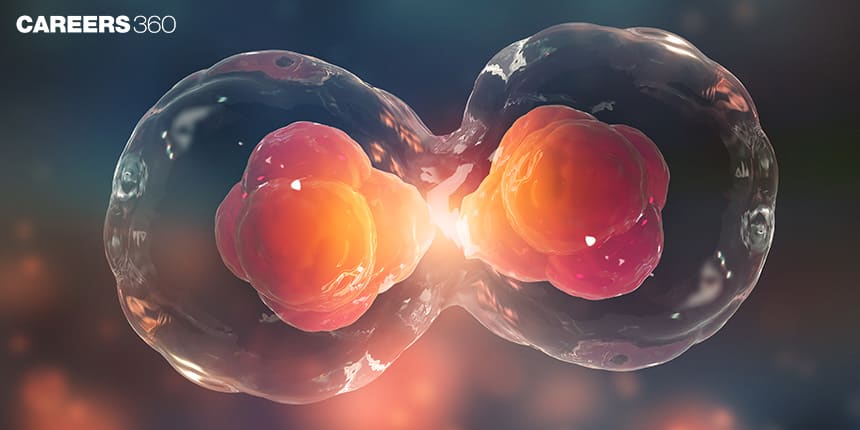
Are you aware that all organisms, including the largest, begin life as a single cell? You might be wondering how a single cell can grow into such a massive organism. Cells, and indeed all living organisms, exhibit growth and reproduction. Every time a cell divides, it produces two daughter cells. These newly formed daughter cells can grow and divide, resulting in the formation of a new population of cells from the growth and division of a single parental cell and its progeny. In other words, such growth and division cycles allow a single cell to grow into a structure with millions of cells.
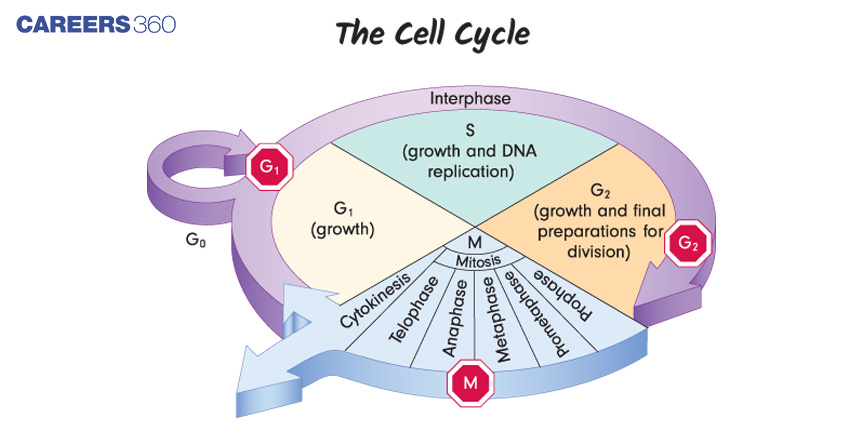
Cell division is a crucial process in all living organisms. DNA replication and cell growth occur simultaneously during cell division. To ensure proper division and formation of progeny cells with intact genomes, all processes, namely DNA replication and cell growth, must occur in a coordinated manner during cell division.
The cell cycle is the process by which a cell duplicates its genome, synthesises other cell constituents, and eventually divides into two daughter cells. While cytoplasmic expansion is a continuous process, DNA synthesis takes place only once during the cell cycle. A complex series of events occur during cell division to distribute the replicated chromosomes (DNA) to the daughter nuclei. These events are also genetically controlled.
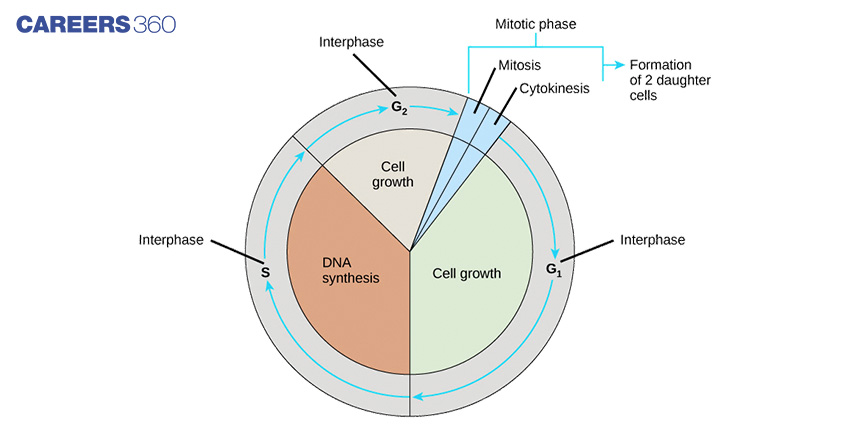
Human cells in culture show how a typical eukaryotic cell cycle works. On an average, the cells divide every 24 hours.
However, the length of the cell cycle depends on the organism and cell type. Yeast, for example, can complete the cell cycle in under 90 minutes. There are two basic phases in the cell cycle: the interphase and the M-Phase (mitosis phase).
The M phase occurs when a cell divides or goes through mitosis, while the interphase occurs between two M phases. The M-Phase starts with nuclear division (karyokinesis) and usually ends with cytoplasmic division (cytokinesis).
Note that during a human cell's 24-hour average cell cycle, cell division lasts only about an hour.
Allied & Healthcare programs | 20+ Partner Universities & Institutes | 98% placement record
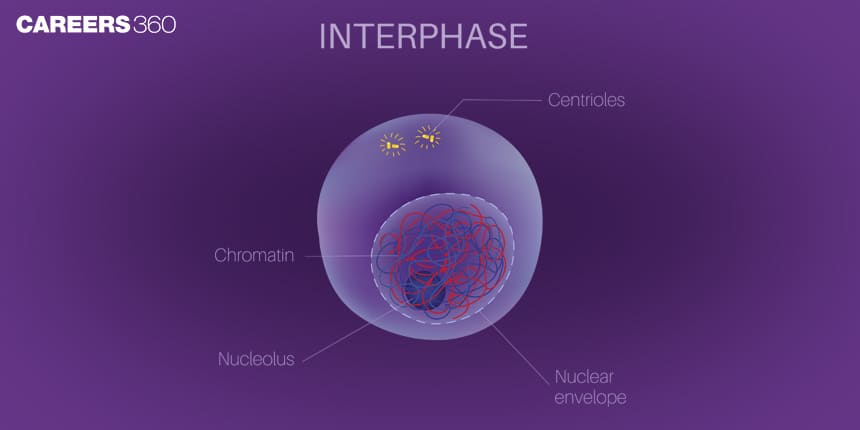
The four stages of the cell cycle were proposed by Howard and Pelc in 1953: G1, S, G2, and M. More than 95% of the cell cycle’s time is spent in the interphase. The interphase, also known as the resting phase, is when a cell prepares for division by going through a controlled process of cell growth and DNA replication.
The interphase is further broken down into three sections:
G1 phase (Gap 1)
S phase (synthesis)
G2 phase (Gap 2)
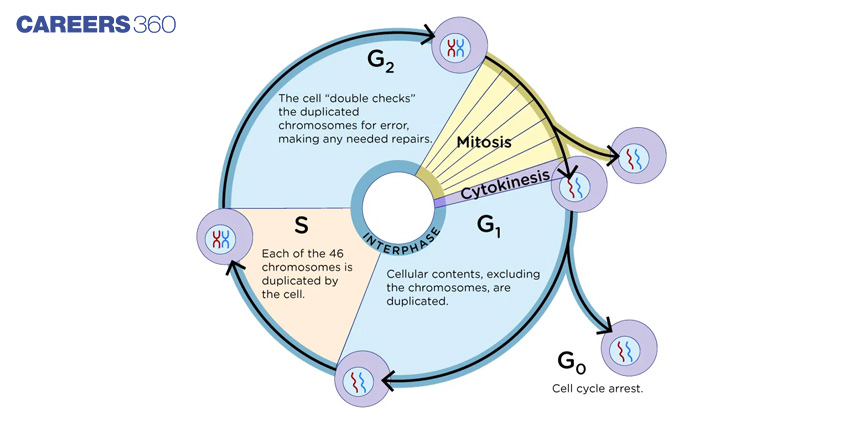
DNA is synthesised or replicated during the S phase, also known as the synthesis phase.
The amount of DNA per cell doubles during this phase. It will increase from 2C to 4C if the starting amount of DNA is 2C. However, the chromosome number does not increase; if the cell had diploid or 2n chromosomes at G1, the number of chromosomes remains the same after the S phase, i.e., 2n.
The process of DNA replication is discontinuous and semi-conservative, resulting in the formation of identical pairs of DNA molecules.
During the S phase of animal cells, DNA replication begins in the nucleus and the centriole duplicates in the cytoplasm.
In order to form nucleosomes, histone proteins are also synthesised.
Proteins are synthesised in preparation for mitosis during the G2 phase, while cell growth continues. So, the RNA, proteins, and other macromolecules required for the multiplication of cell organelles, spindle formation, and cell growth are produced during the G2 phase (Gap 2) as the cell prepares to enter the mitotic phase. The synthesis of tubulin protein takes place in this phase.
Some cells in adult animals do not appear to exhibit division (e.g., neurons and heart cells), and many other cells divide only occasionally, as needed to replace cells that have been lost because of injury or cell death. These cells that do not divide further and undergo differentiation, exit the G1 phase of the cell cycle and enter the quiescent stage (G0). Cells in this stage are still metabolically active, but they no longer proliferate unless the organism requires it.
Only diploid somatic cells in animals go through mitotic cell division. There are a few exceptions, such as male honey bees, where haploid cells divide through mitosis. Plants can show mitotic divisions in both haploid and diploid cells in response to this. Based on your recollection of examples of generation alternation in plants, identify plant species and stages at which mitosis occurs in haploid cells.
Question 1. (NEET 2016)
During cell growth, DNA synthesis takes place in _____.
S phase
G1 phase
G2 phase
M phase
Answer: - (A) S phase
DNA synthesis phase:
After G1, the cell enters the S stage, which is when DNA synthesis or replication takes place.
Each chromosome is made up of one DNA double helix at the start of the S stage.
Each chromosome is made up of two identical DNA double helix molecules after DNA replication.
Each double helix is known as a chromatid.
DNA replication has resulted in duplicated chromosomes, and the two chromatids will remain attached until mitosis separates them.
It will increase from 2C to 4C if the starting amount of DNA is 2C.
However, the chromosome number does not increase; if the cell had diploid or 2n chromosomes at G1, the number of chromosomes remains the same after the S phase, i.e. 2n.
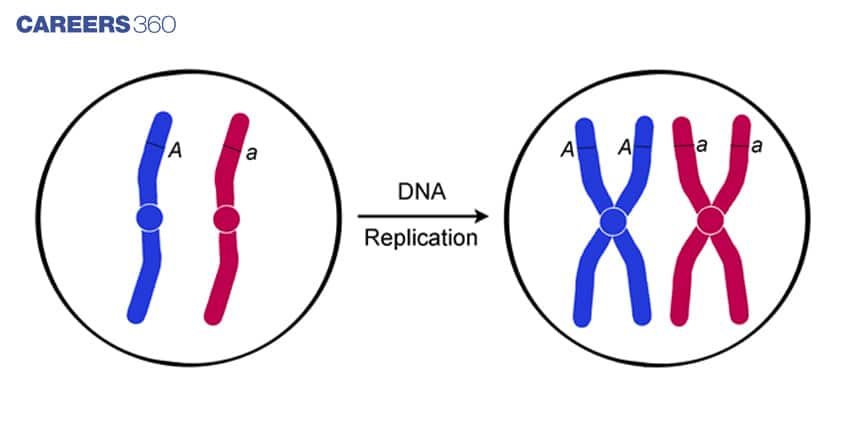
Hence, the correct answer is S-Phase.
Question 2. NEET 2019, NEET 2020 phase 2
The correct sequence of phases in the cell cycle is?
M → G1→G2 → S
G1 → G2 → S → M
S→ G1 → G2 → M
G1 → S → G2 → M
Answer: (D)
The phase between two successive M-phases is represented by the interphase.
The interphase lasts more than 95% of the duration of the cell cycle, also called the resting phase.
The cell cycle is divided into two phases: interphase and M- phase. During interphase, the cell grows and duplicates its DNA.
During the M phase, the cell separates its DNA into two sets and divides its cytoplasm, forming two new cells. Interphase is divided into three subphases, i.e. G1 phase, S phase and G2 phase.
Thus, the sequence of the phases of the cell cycle is G1 → S → G2 → M
Question 3. NEET 2019
Cells in the G0 phase:
exit the cell cycle
enter the cell cycle
suspend the cell cycle
terminate the cell cycle
Answer: (A)
Quiescent Stage (Go) -
A few cells that do not divide, exit the G phase to enter an inactive stage called the G0 phase.
The G0 phase is a period in the cell cycle in which cells exit the cell cycle and enter a quiescent state. At this stage, cells neither divide nor prepare to divide.
Question 4. NEET 2020
Some dividing cells exit the cell cycle and enter the vegetative inactive stage. This is called the quiescent stage (G0). This process occurs at the end of
M phase
G1 phase
S phase
G2 phase
Answer: (A) M phase
G1 is commonly called the pre-DNA synthesis phase or first gap phase. The cell recovers from the previous division.
Research shows a restriction point (R-point) in G1 where cells can enter G0 before reaching this R-point. After the restriction point, however, these are entitled to mitosis. Early research suggests that a G0 state exists. Access to this is, however, limited. Furthermore, cells that do not divide exit the G1 phase and enter the quiescent stage, which is an inactive state. This process occurs at the offset of the M phase.
Question 5. NEET 2020
Identify the correct statement with regard to the G1 phase (Gap 1) of the interphase.
DNA synthesis or replication takes place
Reorganisation of all cell components takes place
The cell is metabolically active, and grows but does not replicate its DNA
Nuclear Division takes place
Answer: (C)
It's also referred to as the first growth phase or "gap." The G1 phase corresponds to the interval between mitosis and the initiation of DNA replication. The cell is metabolically active and grows continuously during the G1 phase, but it does not replicate its DNA.
Question 6. NEET 2020 phase 2
Match the following events that occur in their respective phases of the cell cycle and select the correct option:
(a) G1 Phase | (i) Cell growth and organelle duplication |
(b) S phase | (ii) DNA replication and chromosome duplication |
(c) G2 phase | (iii) Cytoplasmic growth |
(d) Metaphase in M-phase | (iv) Alignment of chromosomes |
a-iii, b-iv, c-i, d-ii
a-iv, b-i, c-ii, d-iii
a-i, b-ii, c-iii, d-iv
a-ii, b-iii, c-iv, d-i
Answer: (C) a-i, b-ii, c-iii, d-iv
Question 7: Match List - I with List - II
List - I | List - II |
(a) S phase | (i) Proteins and synthesized |
(b) G2 phase | (ii) Inactive phase |
(c) Quiescent stage | (iii) Interval between mitosis and initiation of DNA replication |
(d) G1 phase | (iv) DNA replication |
Choose the correct answer from the options given below:
(a) - (iii), (b) - (ii), (c) - (i), (d) - (iv)
(a) - (iv), (b) - (ii), (c) - (iii), (d) - (i)
(a) - (iv), (b) - (i), (c) - (ii), (d) - (iii)
(a) - (ii), (b) - (iv), (c) - (iii), (d) - (i)
Answer: (C) (a) - (iv), (b) - (i), (c) - (ii), (d) - (iii)
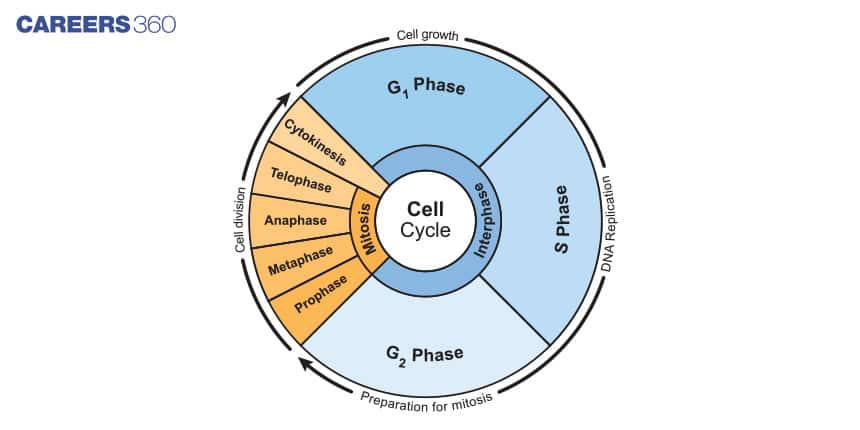
Question 8. NEET 2021
The fruit fly has 8 chromosomes (2n) in each cell. During the interphase of mitosis, if the number of chromosomes at the G1 phase is 8, what would be the number of chromosomes after the S phase?
8
16
4
32
Answer: (A) 8
DNA is synthesised or replicated during the S phase, also known as the synthesis phase. During this time, the amount of DNA per cell doubles. It will increase from 2C to 4C if the starting amount of DNA is 2C. However, the chromosome number doesn't increase. If the cell had diploid or 2n chromosomes at G1, the number of chromosomes remains the same after the S phase, i.e., 2n.
If we analyse the past five years’ papers, except 2017 and 2018, all other papers have one to two questions on the topic –Interphase. From the chapter, Cell Cycle and Cell Division, 18 questions were asked, which has approximately 8% weightage of the total questions asked from Botany. Out of this, seven questions were based on the concept of Interphase. Each year, one to two questions are framed from this topic. The interphase is a crucial step of the cell cycle and cell division process. NEET aspirants need to understand this topic thoroughly to solve the problems and understand the chapter fully in order to score well.
On Question asked by student community
Hi Gawade,
please refer to this article -
https://medicine.careers360.com/articles/neet-ug-mock-tests
You can find the mock test link here
Government Medical Colleges in states like Rajasthan, Uttar Pradesh, Madhya Pradesh, Bihar, Haryana, Punjab, Gujarat, Maharashtra
You still have enough time. For NEET 2026 (drop year, 3 months left), focus on:
NCERT linebyline for highweightage chapters (Human Physiology, Plant Physiology, Cell, Biomolecules, Biological Classification, Plant/Animal Kingdom, Genetics, Ecology)
Daily chapterwise MCQs + PYQs and weekly full mocks with proper analysis
Useful Careers360 links for planning:
NEET
The
NEET cut off 2025
for PwD (handicapped) candidates in Telangana was set at 40th percentile with 126 - 113 marks. Admission to government colleges in Telangana require higher marks as many as over 500 marks in NEET.
For more information, check the given below link.
https://medicine.careers360.com/articles/neet-cutoff-telangana
If a candidate qualifies for NEET PG only after the revision or reduction of the qualifying cut-off, registration for counselling is allowed only if the counselling authority opens a fresh registration or re-registration window for newly qualified candidates. If the system currently shows “you have not registered” and does not
Allied & Healthcare programs | 20+ Partner Universities & Institutes | 98% placement record
Get Job-Ready with New-Age Allied Health Programmes
Get Job Ready in Healthcare | Employability-Focused Programs
Amongst top 3% universities globally (QS Rankings) | Wide Range of scholarships available
Ranked #19 by NIRF, NAAC A++ Accredited | Recognized by dental council of India
Ranked #18 by NIRF, NAAC A++ Accredited | Unmatched clinical exposure with over 7 lakh patients yearly